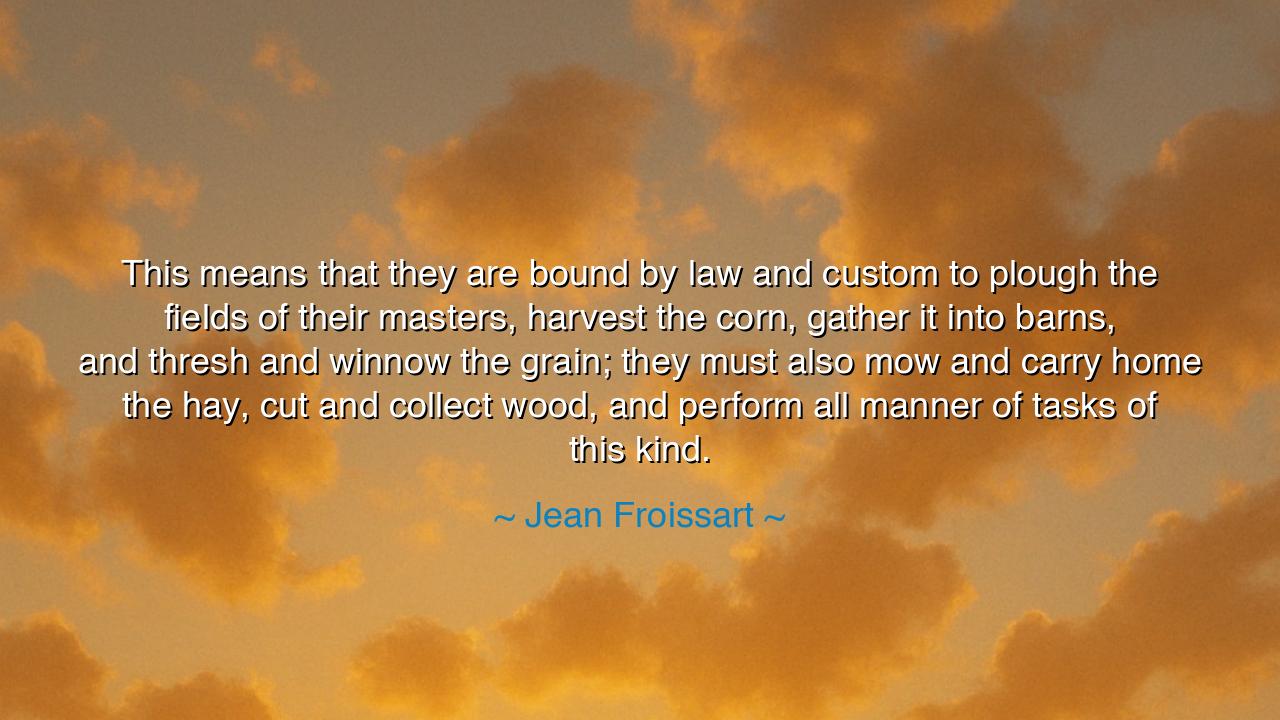
This means that they are bound by law and custom to plough the
This means that they are bound by law and custom to plough the fields of their masters, harvest the corn, gather it into barns, and thresh and winnow the grain; they must also mow and carry home the hay, cut and collect wood, and perform all manner of tasks of this kind.






In the words of Jean Froissart, chronicler of the Middle Ages, there lies the echo of a time when the world was divided by birth and bound by duty: “This means that they are bound by law and custom to plough the fields of their masters, harvest the corn, gather it into barns, and thresh and winnow the grain; they must also mow and carry home the hay, cut and collect wood, and perform all manner of tasks of this kind.” These words are not poetry, but testimony—an unflinching account of the life of the serf, whose back bent beneath both the sun and the law. It is a description of the bondage of labor, the quiet endurance of those whose sweat sustained the splendor of kingdoms.
In Froissart’s time, the fourteenth century, the world was ordered like a great chain: kings ruled by divine right, lords governed the land, knights defended it, and peasants worked it. The custom of servitude was as ancient as the soil itself. Men and women were “bound by law,” meaning that they were not free to leave the fields they tilled. Their hands belonged to their masters, and their toil fed those who ruled them. To plough, to harvest, to winnow, to mow—these were not mere tasks, but lifelong burdens. Froissart, a witness of his age, wrote not with scorn but with the precision of truth, revealing the silent machinery that sustained the glittering courts and grand crusades of his era.
And yet, in those very words, we hear the ancient rhythm of endurance—the heartbeat of the common soul. For though the serfs were bound by law and custom, their labor was the foundation of civilization itself. The castles that rose upon the hills, the feasts that filled the halls, the wars that shaped the maps—all were born from the hands of those who worked unseen. It is the oldest irony of mankind: that power so often grows upon the backs of the powerless. The words of Froissart remind us that beneath every throne lies the field, and within every harvest, the story of those who bent to bring it forth.
History tells of the Peasants’ Revolt of 1381, when the long-suffering workers of England rose up under Wat Tyler and John Ball, crying that “when Adam delved and Eve span, who was then the gentleman?” Their cry was not one of hatred, but of awakening—a demand that the law which bound them be broken, that the fruits of their own hands might feed their own children. Though the rebellion was crushed, its flame burned in the hearts of generations to come. It marked the beginning of the long ascent from bondage to dignity, a struggle that continues in every age and every land where labor is undervalued and freedom is denied.
The quote, then, is not only a record of oppression—it is a mirror held to the eternal condition of mankind. Even in our own age, when chains are made of debt instead of iron, and servitude hides behind comfort and wage, the same truth lingers. To be “bound by law and custom” is not merely to work, but to be trapped in systems that promise stability while denying growth. Froissart’s words awaken us to the question: who reaps the harvest of our toil? And what customs do we still obey without question, mistaking them for the natural order of things?
Yet within this tale of subjugation lies a lesson of endurance and transformation. For the same hands that once served masters learned, over time, to serve themselves. The plough, once the symbol of servitude, became the emblem of honest work. The fields, once a prison, became the proving ground of independence. Humanity rose, not through conquest alone, but through the steady courage of those who refused to be forever bound by the laws of their birth. From the serf’s struggle grew the farmer’s pride, the craftsman’s freedom, and eventually the citizen’s right.
Therefore, let all who labor take heed of Froissart’s words—not as relics of a forgotten age, but as living counsel. Work with dignity, but never let your labor become your chain. Question the laws and customs that bind your worth, and seek always the justice that honors both effort and soul. For every field you till, every burden you bear, every task you perform, carries within it the seed of your own liberation.
And remember this final truth, passed down from those who came before: though the masters of each age may claim your time and your toil, they cannot own your spirit. The ploughman’s strength, the harvester’s endurance, the worker’s will—these are eternal. They are the foundation upon which every civilization is built, and the force that, through courage and persistence, will one day make all men free.






AAdministratorAdministrator
Welcome, honored guests. Please leave a comment, we will respond soon